
JOIN US
GET OUR KUNEKUNE
NEWSLETTER
New and highly discounted products, fresh and hot stories & useful information
KuneKune Pork
Learn about KuneKune Pork, KuneKune Pork Price and where to Purchase KuneKune Pork.
A delicacy, KuneKune pork is just waiting to be discovered.
With its rich, marbled meat locked in a layer of fat for extra flavor and texture, KuneKune pork is sure to please your family and guests. Come explore the unique experience this delicious pork can offer! Learn about the factors that affect the KuneKune Pork price. Get tips on finding KuneKune pork for sale so that you can purchase KuneKune Pork near you!
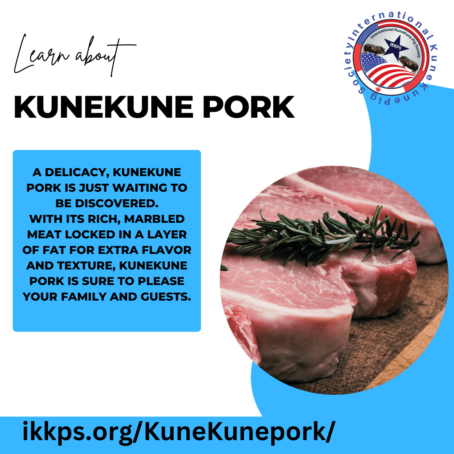
Click to be directed to that part of the page.
Commonly Asked Questions about KuneKune Pork
What is KuneKune Pork?
KuneKune pork, derived from a unique breed of pig known as KuneKune, offers numerous advantages when it comes to both taste and nutritional value. These small-sized pigs are typically raised in pasture-based systems, resulting in a superior quality of meat. From its rich flavor to its health benefits, KuneKune pork has gained recognition among food enthusiasts worldwide.
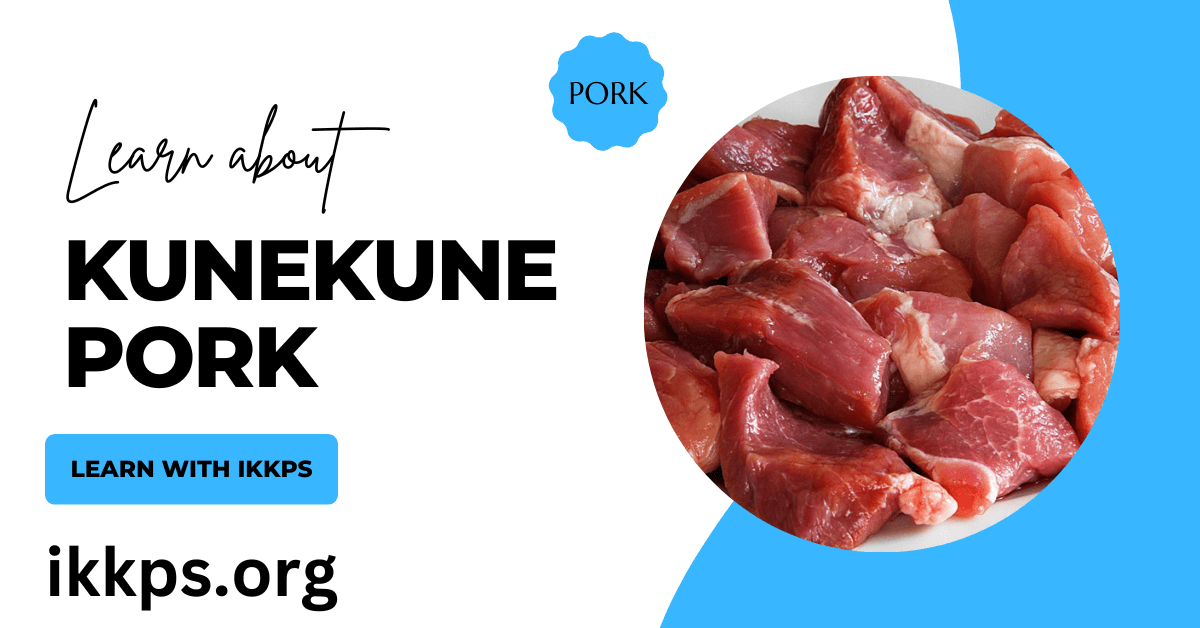
What are the benefits of eating KuneKune Pork?
Is KuneKune Pork good?
One of the primary benefits of consuming KuneKune pork is its exceptional taste. Due to KuneKune pigs being allowed to freely graze on diverse grasses, herbs, and other natural forage, their meat develops a distinct flavor profile that is exceptionally succulent and tender. The meat marbling of KuneKune pork is evenly distributed, resulting in enhanced flavor, juiciness, and tenderness compared to conventionally raised pigs. This unique taste can elevate culinary experiences and provide a new level of enjoyment in meals.
What is the Nutritional Benefits of KuneKune Pork?
In terms of nutritional benefits, KuneKune pork offers a range of advantages. Firstly, it is a great source of protein. Protein is essential for the growth, repair, and maintenance of body tissues, and consuming KuneKune pork can contribute to meeting daily protein requirements. Additionally, the protein content in KuneKune pork can aid in building and maintaining muscle mass, making it a favorable choice for athletes or individuals who engage in regular physical exercise.
KuneKune pork also provides various essential vitamins and minerals that play vital roles in maintaining overall health. It contains important B vitamins, such as thiamine, riboflavin, niacin, and vitamin B12. These vitamins are crucial for energy metabolism, nerve function, and the production of red blood cells. Additionally, KuneKune pork is a source of minerals like iron, zinc, and selenium, which are essential for immune function, growth, and development.
Moreover, KuneKune pigs are known for their high fat content, specifically containing a higher level of monounsaturated fat compared to other pig breeds. Monounsaturated fats are considered beneficial fats as they contribute to healthy cholesterol levels and support heart health. The marbling found in KuneKune pork meat helps maintain moisture during cooking, ensuring juicy and flavorsome results while still maintaining a reasonable fat content.
Are there any other advantages of choosing KuneKune pork?
Another advantage of consuming KuneKune pork is its more sustainable production system. KuneKune pigs thrive in pasture-based environments, efficiently converting forage into high-quality meat. Pasture-raised systems are known for their lower environmental impact compared to conventional industrial pig farming. KuneKune pigs contribute to the maintenance and improvement of pasture ecosystems as they help control weeds, distribute organic matter, and enhance soil fertility through their natural grazing behavior.
Summary
In conclusion, the benefits of eating KuneKune pork extend beyond its exceptional taste. It offers a range of nutritional advantages, including a high protein content, essential vitamins and minerals, and a favorable fatty acid profile. Additionally, its sustainable production system aligns with an environmentally conscious approach to farming. By choosing KuneKune pork, consumers can savor a unique culinary experience while promoting individual health and supporting sustainable farming practices.
KuneKune Pork Price: The Factors that Affect KuneKune Pork Pricing
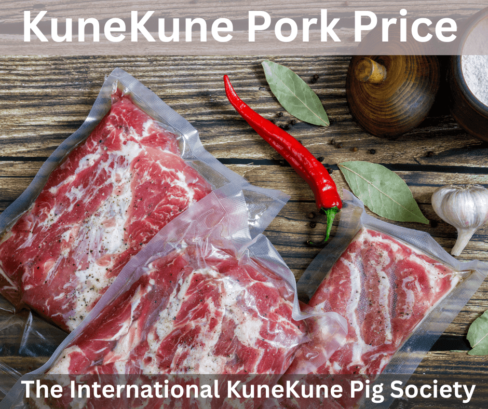
The Price of KuneKune Pork: A Reflection on Quality and Value
When it comes to purchasing KuneKune pork, one may wonder about the price range they should expect to pay. As an increasingly popular choice among pork enthusiasts, the unique qualities and production methods associated with KuneKune pork contribute to its distinct price range. We aim to explore the factors that influence the pricing of KuneKune pork and provide an understanding of the monetary investment one should anticipate.
The KuneKune pork price will vary from state to state. However, in general, you can expect to pay anywhere from $8-$16 in general. Charcuterie will most likely be more! There are so many pork cuts available and prices will vary.
The KuneKune Breed:
KuneKune pigs, native to New Zealand, have gained global recognition for their exceptional flavor and marbling. However, compared to conventional pork breeds, KuneKune pigs have a slower growth rate and therefore, a subsequent higher price range.
Sustainable Farming Practices:
One of the primary reasons for the higher cost of KuneKune pork is the sustainable farming practices integral to its production. KuneKune pigs are typically raised in small-scale, free-range environments, allowing them to graze on pastureland. KuneKunes are amazingly efficient grazers! Such practices prioritize animal welfare, encourage biodiversity, and minimize the use of harmful chemicals. However, these conscientious cultivation techniques require additional resources and labor, which is reflected in the purchase price.
Specialized Diets and Ethical Considerations:
To ensure the best quality pork, KuneKune pigs are fed a specially formulated diet, often including a variety of natural feeds, vegetables, and fruits. KuneKunes requires a feed that is 16% or less. This type of nutritional program adds to the overall cost of raising the animals.
Many KuneKune breeders adhere to ethical principles by avoiding the use of antibiotics and hormones, which also contributes to increased expenditure in the overall production process. Luckily, being a heritage breed of pig, the KuneKune is a very hardy pig that does well in most climates.
Breeders' Expertise and Reputation:
Does this really matter? Certainly, it does! KuneKune breeders who dedicate their time and knowledge to the meticulous rearing and breeding of these pigs deserve recognition for their expertise, experience, and reputation. Their commitment to maintaining the breed's unique traits and ensuring strict adherence to breed standards adds further value to KuneKune pork. Consequently, their proficiency and reputable standing are often reflected in the price of their product.
Supply and Demand Dynamics:
The limited supply versus the growing demand for KuneKune pork is another influential factor affecting its pricing. As more people become aware of the breed's distinctive flavor and ethical production, the demand for KuneKune pork rises. However, due to the breed's slower maturation rate, the supply remains inherently limited. This inherent scarcity contributes to a higher price range for KuneKune pork.
As more breeders begin to utilize their pigs for pork production programs, this is going to change. Actually, it already has over the last 2-3 years. Breeders are realizing that not every pig is meant to be breeding stock. The golden rule of "Sell the best and eat the rest" is becoming more of the norm for ethical breeders. With rising costs in this economy, more homesteaders are focused on producing food on their farms.
Summary
The price of KuneKune pork is influenced by several factors. These include the KuneKune breed's unique characteristics, sustainable farming practices, specialized diets, breeders' expertise, and reputation, as well as the supply and demand dynamics. While one should expect to pay a higher price for KuneKune pork compared to conventional pork, it is important to recognize the value and benefits associated with this premium product. The investment in KuneKune pork goes beyond its exceptional taste, encompassing ethical considerations, sustainable farming practices, and support for dedicated breeders. The price offers a reflection of the quality, care, and craftsmanship involved in producing this distinguished meat.
Purchase KuneKune Pork - Learn where to find KuneKune Pork for sale.
Specialty meats have become increasingly popular among food enthusiasts and those seeking sustainable meat sources with unique flavors. One such delicacy gaining popularity is KuneKune meat, known for its exceptional quality and distinct flavor. If you are searching for KuneKune meat for sale, there are various avenues to explore, including local farms and online platforms. We will discuss some popular outlets where you can find KuneKune meat, enabling you to enjoy this delectable meat from your home.
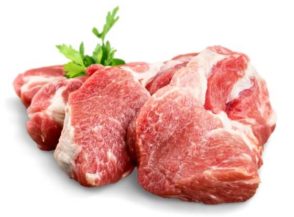
Local Farms and Farmers' Markets:
One of the best ways to find KuneKune meat for sale is by sourcing it directly from local farms or farmers' markets in your area. Many farmers breed and raise KuneKune pigs, offering their products to the local community. By purchasing from local farms, you get access to fresh and high-quality meat and support sustainable and ethical farming practices. Additionally, you can establish relationships with the farmers and learn about their rearing methods and the origins of the meat, contributing to a deeper connection with your food.
Specialty Butcher Shops:
Another avenue to explore is specialty butcher shops that cater to diverse meat preferences. These shops often stock unique and niche meats, including KuneKune. Specialty shops ensure that the meat they provide is sourced from trusted suppliers who follow ethical and sustainable farming practices. Furthermore, you can benefit from the expertise of the butchers, who can guide you on the different cuts of KuneKune meat available and suggest suitable cooking methods to enhance its flavor.
Online Marketplaces:
With the rise of e-commerce, browsing and purchasing products online has become increasingly common. This holds true for KuneKune meat as well. Numerous online marketplaces specialize in selling premium and specialty meats, offering customers access to a wide range of options, including KuneKune meat. When ordering online, it is crucial to do thorough research and choose reputable sellers who prioritize the welfare and quality of their products. Reading customer reviews can also provide insights into their reliability and the quality of their meat.
Directly from KuneKune Breeders:
To ensure the authenticity and quality of KuneKune meat, you can directly contact KuneKune breeders who might offer meat for sale alongside their primary breeding activities. Breeders who maintain their own herds are typically highly knowledgeable about raising KuneKune pigs, ensuring the best practices for breeding and rearing them. By purchasing from breeders, you can have greater confidence in the quality and integrity of the meat, given their firsthand involvement in the entire process.
Conclusion
In conclusion, locating KuneKune meat for sale has become increasingly accessible due to the growing consumer demand for specialty meats. Local farms, farmers' markets, specialty butcher shops, online marketplaces, and even KuneKune breeders themselves are viable options to explore when sourcing this unique and flavorsome meat. Remember to prioritize ethical, sustainable, and reputable sources to ensure the highest quality and support responsible farming practices. With the abundance of options available, you can now indulge in the delightful experience of preparing and savoring KuneKune meat at home.
Quick Tips for finding KuneKune pork for sale
With so many homesteaders utilizing their KuneKune pigs for meat, it has never been easier to find some KuneKune meat for sale near you.
One of the very best places to be assured you are getting real KuneKune meat for sale is by using a KuneKune Registry. KuneKune Registries are registering purebred, DNA verified, registered KuneKunes. If you are using social media or other avenues to seek KuneKune meat for sale, you could be easily fooled by mixed breeds and crosses.
Visit the KuneKune Registries, membership list, and/or breeder's list. There you will find a list of KuneKune breeders in your area. You can contact them in regards to finding some KuneKune meat for sale.
IKKPS has a breeder's map and that is an easy way to find KuneKune breeders near you directly using the interactive map.
Visit your local farmers market to ask around about KuneKune meat for sale. There are KuneKune Breeders that set up at the farmer's market to sell their pork products.
Search on Google or Bing with the phrase "KuneKune meat for sale". That is a risky option but, could yield results for you.
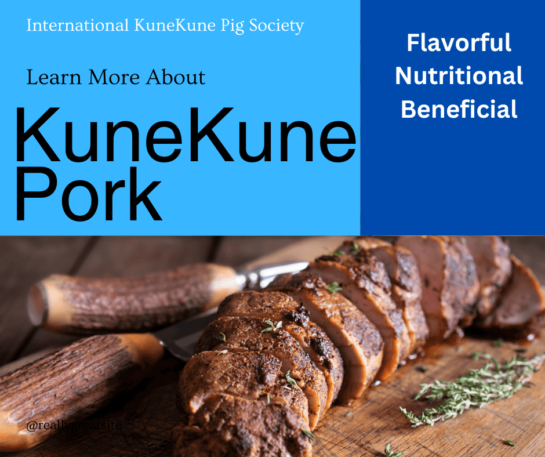
Learn more about KuneKune Pork
This is about our experience the first time we utilized our pigs for pork.
First, KuneKunes are continuing to grow in homesteads and farms across the country. This breed is gaining in popularity and quickly becoming an alternative to commercial pork as KuneKune meat is a healthier option. Second, KuneKunes are a true multi-purpose pig. Finally, they are friendly, docile, smart, true grazers, and do not tend to root or test fencing like the bigger commercial swine breeds.
Therefore, they are winning over the hearts of America. We will discuss not only KuneKune pork but, also where you can find KuneKune meat for sale for your family.
Where KuneKune Come From
KuneKunes are originally from New Zealand where they were kept by the Māori tribe as a meat pig. They allowed them to roam free. KuneKunes chose to stay close to the village. In the USA, we have been through various trends with this breed from pets only, to breeding stock. Now they are gaining popularity in pork production for homesteaders and are known for their KuneKune meat.
My Start
First, when I began breeding, my interest was in breeding stock and pets. As a result, I too have moved in many directions with this breed. One of the reasons that this breed is so amazing – it has many uses. Also, using our stock for pork production for their valued KuneKune meat. Consequently, this is something I never saw myself doing when I began my journey with KuneKunes Pigs. For Instance, I am an animal lover through and through and could not even imagine harvesting something that had lived here on our small acre farm.

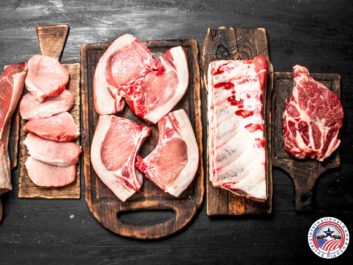
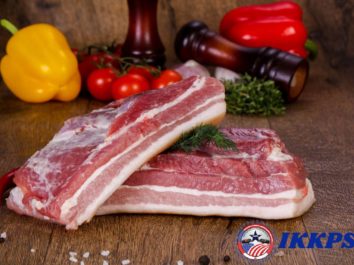
Preservation through Utilization - some things to consider
First, not every piglet is meant to be sold for breeding stock. I see an increasing number of KuneKunes being produced and sold for breeding stock when they should be culled. (I used to think that the word culled meant it was killed. It simply means that they will be raised and later harvested.) As a result of breeding, there are less than perfect piglets born all the time and they can serve many other uses. Being utilized for KuneKune meat is one of those uses.
For Instance, we have piglets in pet homes, in therapy homes, and in nursing homes as therapy animals to name just a few. Most importantly, for this heritage breed to continue to thrive in the USA, it is important only to sell the piglets of the best quality for breeding stock and to use them for their many purposes. In the past, I have sold piglets for pets that were spayed and neutered. Now I realize what a wonderful outlet it is to also harvest them for delicious KuneKune meat and to provide your family and friends with pork that you know how it was raised and cared for.
The Tide is Turning
As a result of marketing, there is a growing amount of people who care about the “factory” farms. Like when I see the videos of how these animals are forced to live, breed, and care for their young it truly bothers me. Until those videos, I never really thought about the meat that I pick up in the supermarket in the meat department. Thus, seeing those videos has altered the way I think.
The mothers are forced to stand to feed their babies or forced down and held down by metal bars. Likewise, they are not allowed to farrow in the nest of soft hay as nature tells them to. Forced, they raise their young under extreme distress. As a result, then their babies are ripped from them at early ages and not allowed to stay and learn from their mothers. Furthermore, this cycle repeats itself over and over until the mom is too weak to do it again and then she is harvested.
Those Special Moments
Gazing out over the fields and seeing the mom’s grazing with their piglets - sneaking a suckle here and there. It is so peaceful and calm to watch. The natural environment that the mother creates and the way that she interacts with her offspring is amazing to watch. Singing to them while they nurse. Talking to them to move when she is trying to lay down. It is truly a humble and peaceful experience. In all the heartbreaks of raising livestock, this is the reason that farmers get their strength to continue.
How I Begin to Evolve
I did a bunch of research and talked to other breeders who were harvesting KuneKunes for their pork before doing it myself. The first time I tasted KuneKune Pork was at a Farm to Table Restaurant. I had an exceedingly challenging time swallowing it, as I was thinking of my piggies at home. The second time, over a year later, I was introduced to KuneKune meat at a show at another breeder’s home. They had grilled the pork. It was excellent. That made me think……
I took a couple of pigs that I deemed not worthy of producing piglets to start my KuneKune meat program. Raising them in a caring environment with the same care and attention as all my other pigs. Fed well, grazed, fed fodder, fruits and veggies, and some grain. Certainly, they lived an incredibly happy and calm life. Enjoying their lives and being free to be pigs. Moving about as they chose. Living a good life.
Weight when Harvested
Reaching the age of harvest between 125-150 lbs., it was time. I thought this would be something I would not be able to go through with. However, I found a wonderful guy to help me harvest my stock. He even picked them up in his trailer and loaded them in. My little piggies went off happy and munching away in the back of a trailer. I must confess that I did cry a bit when they first pulled away. (Anyone who knows KuneKunes knows that they are funny, affectionate little creatures and you cannot help but get attached to them.)
Not too long after they were gone, I felt better about my decision and began to look forward to the return of the pork. Being told that your harvest would yield about 67-75% of a pig’s weight, I found that to be true. KuneKunes produces marbled red meat that is surrounded by fat which helps keep the flavor in better.
Eating KuneKune Pork - the test begins
So, I made it through sending them off and receiving the KuneKune meat is back……now for the true test! To eat pork. My husband cooked a package of sausage for breakfast one morning and I can tell you honestly that it was wonderful! Move over Jimmy Dean! I am not normally a big sausage fan but, this was utterly amazing. Next, I tried the pork chops. They were so tender that you could cut it with a fork. Unbelievable to taste such fabulous meat.
I shared our meal with a family from out of town and they too could not believe how wonderful it was. In that moment, I realized what farmers from years ago must have felt……. proud. I was proud that I raised these pigs with care in a friendly, grazing environment and was about to feed my family and friends.
The Reverse Side.
Some folks are not ready to harvest something that they raise. As a result, they may find it difficult to believe that you can harvest an animal that you have loved and cared for. I totally get that! However, I was there once, and I am glad that I have evolved with the breed as so many others before me have done.
Consequently, not every piglet was meant to be bred and with KuneKunes there is another outlet for the not-so-perfect piglets. The old saying goes, sell the best and utilize the rest. What better way to utilize them for other than feeding your family?
In conclusion, I hope that you enjoyed this article and found it helpful in learning more about KuneKunes Pigs and their many uses.
by Kathy Petersen, former breeder, and owner of Virginia KuneKunes.
In Conclusion
Putting food on your family table is important - not only to you but to your family. You can take pride in feeding KuneKune Pork to friends and family.
For further referencing here are some great articles:
Additional Articles on this topic
Farmers Who Raise Heritage Hogs by Sue Weaver
While this is not specifically about KuneKunes it is a particularly good article
Farmers who raise heritage hogs know their pork is the best in the land, but taking your meat to market can put you up against a firing range of skeptics. Farmers’ market customers who haven’t been schooled in the benefits of buying heritage pork might scoff at the higher price of pork you charge, but that doesn’t mean you can’t still gain their business. With a little persistence and education, you can change their minds and earn life-long customers. Gear up for your next market with these eight talking points.
Humanely Raised Hogs
Let your customers know that your heritage pork is raised on pasture under humane conditions, unlike conventional pork marketed through mainline retailers. All commercial pork is raised in large, confinement settings known as CAFOs (concentrated animal feeding operations). A large CAFO building holds up to 2,500 sows or 10,000 market hogs, according to the Environmental Protection Agency.
Once impregnated, CAFO sows are locked in narrow metal gestation crates on unbedded cement floors, where they can’t walk or turn around. Near the end of their four-month pregnancies, they’re moved to equally tiny farrowing crates, where they give birth and nurse their piglets. When their pigs are weaned, they’re bred again, and the cycle continues. Most CAFO sows never see the sun or breathe fresh air until they go to slaughter.
Contrast this with conditions on a heritage-hog farm, where pregnant sows roam at will, build roomy nests for their piglets and then raise them in family groups. Sows and growing pigs root, graze, and enjoy the sun and fresh air daily. They lead healthy, happy lives because they can engage in natural pig behaviors.
Environmental Sustainability
Pasture-raised heritage pork is better for the environment. Hog CAFOs generate astounding amounts of urine and manure—up to three hundred million tons nationwide, according to the Union of Concerned Scientists. That is twice as much as produced collectively by humans in the U.S. Operators often store the waste in cheap, ineffective “lagoons,” open-air pits lined with clay or geo-membrane plastic. The lagoons can be smelled miles away and sometimes leak or spill over, contaminating groundwater when they do. Hogs in pasture deposit waste outdoors across larger areas, where it nourishes the soil and doesn’t contaminate water supplies.
Fewer to No Antibiotics
Pork raised by conscientious producers, like heritage hog farmers, is healthier than pork raised on confinement farms. Hogs on CAFOs are routinely fed and injected with antibiotics, even when they aren’t sick. According to the UCS, 70 percent of the antibiotics and related drugs sold in the United States are used in agricultural settings, particularly CAFOs. Some are used to keep animals healthy in stressful, overcrowded conditions, while others are used to boost feed efficiency.
Indiscriminate use of antibiotics causes harmful bacteria to become resistant to drugs, like vancomycin, used for treating certain life-threatening infections in humans. Now synercid, a drug used to treat vancomycin-resistant infections, is threatened because of the use of virginiamycin as a growth promoter in hogs and chickens. If this behavior of overuse continues, we will run out of effective antibiotics to treat livestock diseases.
Breed Conservation
Raising heritage hogs helps preserve traditional breeds for future generations. When a breed is lost, a part of our agricultural heritage is lost forever, but eating meat from endangered breeds helps them survive. Farmers can’t afford to produce heritage hogs unless consumers buy their products.
Agricultural Diversity
Consumers who buy heritage pork contribute to the preservation of agricultural diversity. Most of the pork produced in the United States comes from four breeds genetically selected to mature quickly and perform well in confinement conditions: Landraces, Hampshire's, Yorkshires and Durocs. Should these breeds fail to thrive, America’s supply of pork could be severely threatened. That won’t happen if hardy, heritage breeds are available to take up the slack.
Healthy Pork
Pasture-raised heritage pork is more nutritious than supermarket pork. According to a study published in 2011 in the British Journal of Nutrition, people who ate moderate amounts of grassfed meat for as little as four weeks had healthier levels of essential fatty acids. When participants of the study who were in good health ate grassfed meat, their blood levels of “good” omega-3 fatty acids increased, and their levels of “bad” omega-6 fatty acids decreased. Pork from pastured hogs is also higher in conjugated linoleic acid (a “good” fatty acid that helps lower cholesterol and triglycerides), beta carotene and vitamin E, according to a 2009 study at Clemson University.
High-quality Lard
Conventionally raised hogs are bred for lean carcasses, but fat (aka lard) is what makes heritage pork sing. Heritage pork is marbled with fats that help a human body stay healthy and strong, thanks to beneficial fatty acids (mentioned above) that lower cholesterol. It is also high in vitamin D and void of harmful trans-fats, according to Wayne Martin, alternative livestock specialist at the University of Minnesota Extension. Some heritage breeds, like Mule Foot, Mangalitsa, Choctaw and Guinea Hogs, were developed as extra-fatty lard hogs. Ask your great grandma what the old-time pastry maker’s secret ingredient is, and she’ll say lard every time.
Better Taste
Best of all, pasture-raised heritage pork tastes infinitely more complex than plastic-wrapped supermarket pork. Commercial pork is pale, dry, and bland, while heritage pork comes in an array of textures and flavors. If your customers want extra-lean pork with just a touch of inter-marbled fat, sell them meat from Tamworth's or non-commercial Duroc hogs. If they’d prefer lean meat with a bit more marbling, pork from non-commercial Hampshire's and Yorkshires or from Chester Whites, Spotteds and Poland Chinas fill the bill.
When they crave well-marbled, juicy meat, suggest Berkshire, Large Black, Gloucestershire Old Spots or pork from lard-breed hogs. When buyers aren’t sure what they prefer, hand out samples. Take a booth to county fairs and farm expos in your area. Distribute heritage pork on a toothpick or a cracker. When people taste it, they’ll be hooked.
Tags CAFOs, Lists
Filtered Under Animal Care, Pigs
Sue Weaver lives in the Arkansas Ozarks with her husband and a fine array of animal friends including goats, sheep, horses, chickens, a donkey, a llama, and a pet razorback hog.
Registry Office
17500 Hamilton Arms Court Dewitt, VA 23840